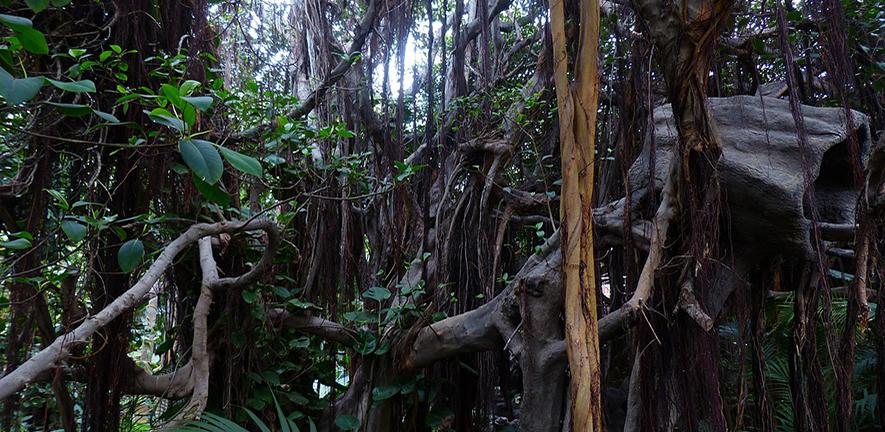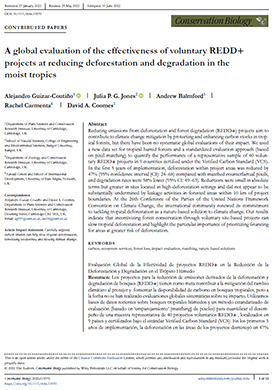
Submitted by Anonymous on Thu, 10/11/2022 - 13:43
New evidence suggests that REDD+ projects in the tropics have helped reduce deforestation, particularly in regions of rapid land use change
Tropical deforestation and degradation are significant contributors to global greenhouse gas emissions. Projects aimed at Reducing Emissions from Deforestation and Forest Degradation (REDD+) in exchange for carbon finance are helping to curb those emissions, but global analyses of their effectiveness using standardised approaches are needed.
A pioneering study by researchers from the Conservation Research Institute, in partnership with colleagues at the University of Bangor, has shown that REDD+ projects are effective at reducing forest destruction, particularly in regions where forests are most endangered. The study used a database of forest cover based on long-term satellite imagery to conduct a “quasi-experiment”, taking 40 areas of forest under REDD+ carbon offsetting schemes, analysing progress over the first five years, and comparing them with “matched” areas of forest that weren’t being protected under REDD+ programmes.
On average across the 40 sites, 33 of which were in central and south America, these projects reduced deforestation rates by 47% over the five-year period, on average. However, most of the projects were located in regions that were not imminently under threat from large-scale deforestation, and the amount of forest saved by those projects was small. The research estimated that only 13 thousand hectares were spared each year, a tiny fraction of the 3.75 million hectares of primary tropical forest that are lost each year. Projects located in high deforestation regions were most effective: 74% of the total forest saved was situated in 7 projects in these regions.
The study offers some optimism, according to Alejandro Guizar Coutiño, lead author, “Our analysis provides evidence that carbon offset REDD+ projects have helped to reduce deforestation, particularly in regions of higher threat. Despite the many challenges to just and economically sustainable implementation, the initial wave of REDD+ carbon offset projects have been effective at reducing deforestation. However, the area of forests spared over the first five years is small. ”
At UNFCCC COP 26 last year, 148 states representing over 90% of the world’s forests, renewed the international community’s commitment to tackling tropical deforestation as a nature-based solution to climate change.
“The case for tropical forest protection being key to climate change mitigation only grows stronger as we gain understanding”, said David Coomes, Professor of Forest Ecology and Conservation at the University of Cambridge and head of the Conservation Research Institute. “Yet, emissions reductions in the 40 projects analysed represent a tiny fraction of global emissions. The need to learn from successes and failings of established REDD+ projects is urgent if carbon offsets are to play a significant role in addressing the interlinked climate and biodiversity crises.”
Read the paper:
Guizar-Coutiño, A., Jones, J. P. G., Balmford, A., Carmenta, R.,. Coomes, D.A. 2022. A Global Evaluation of the effectiveness of voluntary REDD+ projects at reducing deforestation and degradation in the moist tropics. Conservation biology. https://conbio.onlinelibrary.wiley.com/doi/epdf/10.1111/cobi.13970
Read more:
Conservation Research Institute - https://www.conservation.cam.ac.uk/
Plant Sciences department - https://www.plantsci.cam.ac.uk/
Professor David Coomes - https://www.plantsci.cam.ac.uk/directory/david-coomes

